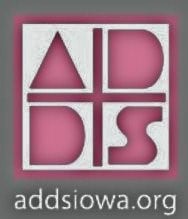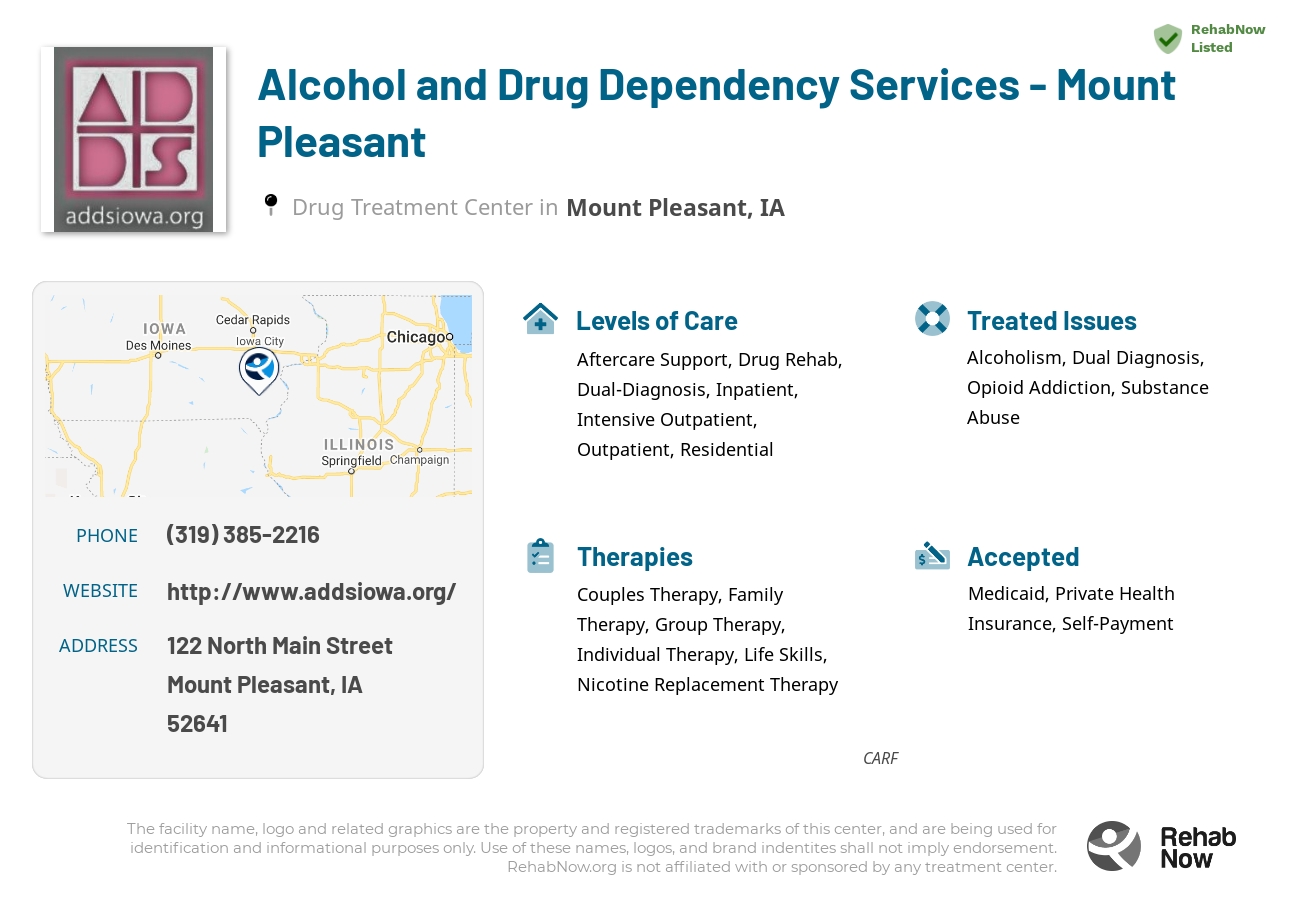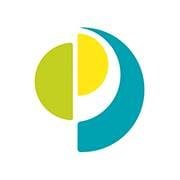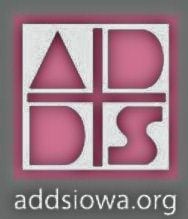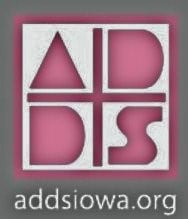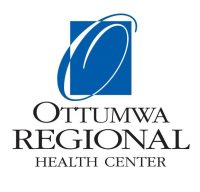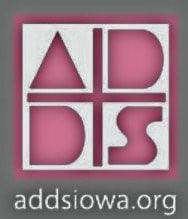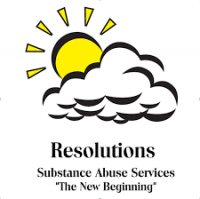Alcohol and Drug Dependency Services - Mount Pleasant
Drug Rehab Center in Mount Pleasant, Iowa
Alcohol and Drug Dependency Services - Mount Pleasant provides evidence-based treatment for addiction and substance abuse in Iowa, offering personalized plans that rebuild the spirit of individuals while they become healthier and more independent.
About Alcohol and Drug Dependency Services - Mount Pleasant in Iowa
Alcohol and Drug Dependency Services - Mount Pleasant is a non-profit organization that provides treatment for addiction and substance abuse in Mount Pleasant, Iowa. They offer individualized treatment plans for those battling substance abuse issues that are rooted in evidence-based practices and are tailored to meet the needs of the individual. Their staff of highly trained professionals works to provide not only the skills needed to overcome addiction and make lifestyle changes, but to also rebuild the spirit of the individual while they become healthier and more independent.
Alcohol and Drug Dependency Services - Mount Pleasant offers a variety of treatments to address addiction, such as medical assessments and treatments, individual therapy, group therapy, family therapy, and aftercare services. They also have programs to help with relapse prevention, life skills development, and relationship building. They work with clients to create a safe and comfortable environment where they can make progress and work towards recovery.
Alcohol and Drug Dependency Services - Mount Pleasant is accredited by The Joint Commission, a leader in healthcare accreditation, and is licensed by the Iowa Department of Public Health. They are also proud to offer a unique service of integrated trauma-informed treatment which is designed to help those who have experienced trauma heal and get back on the path to recovery.
Genders
Ages
Modality
Additional
Accreditations

CARF
The Commission on Accreditation of Rehabilitation Facilities (CARF) is a non-profit organization that specifically accredits rehab organizations. Founded in 1966, CARF's, mission is to help service providers like rehab facilities maintain high standards of care.
Conditions and Issues Treated
Substance abuse creates problems that affect people in Mount Pleasant, IA on many levels. First, substance abuse affects the individual who is abusing drugs or alcohol. This can result in health problems, including heart damage and overdose. Substance abuse also affects the user’s family, friends, co-workers, classmates, or peers. These people feel frustrated because they do not know how to help their loved ones struggling with addiction. At the same time, the addict cannot control his behavior. Lastly, friends and family members of addicts are affected financially by substance abuse.
The good news is that effective treatments can help prevent substance abuse or treat its effects on the user. These treatments, which include behavioral therapy and counseling sessions, target the underlying causes of substance abuse, helping users achieve sobriety so they can regain control over their lives. They also teach users to cope with stress in ways other than using drugs or alcohol.
Opioid addiction has become a significant health problem in the United States. When a person’s life becomes unmanageable because of an opioid addiction, treatment can help them get sober. Treatment includes medical care and counseling.
“With so many people struggling with opioid addiction, we need more care and attention for those who want to quit. Opioid addicts often take opioids when they experience a painful injury – that’s how the cycle starts! When someone begins taking their medication differently than prescribed or takes an excessive amount of drugs, it means they’re hooked on drugs and in danger of overdosing.
The most successful way to beat this is through detoxing from these types treatments at Alcohol and Drug Dependency Services - Mount Pleasant in . Most facilities start by using medical support during the process while providing counseling services; rehabilitation comes later on after treatment has been completed successfully.
A “dual diagnosis” is when the individual has two medical issues at the same time. The top co-occurring mental disorders with addiction are depression, anxiety, ADHD, bi-polar disorder. Addiction is also considered a mental illness that is not a choice but rather a medical condition. Addiction can be caused by any number of underlying issues.
Dual diagnosis is provided by Alcohol and Drug Dependency Services - Mount Pleasant to treat addictive tendencies as well as any untreated mental illnesses. This ensures successful long term health and recovery for patients after treatment has been completed.
Dual diagnosis is provided by Alcohol and Drug Dependency Services - Mount Pleasant to treat addictive tendencies as well as any untreated mental illnesses for people in Iowa. This ensures successful long term health and recovery for patients after treatment has been completed.Levels of Care Offered
This center offers a variety of custom treatment tailored to individual recovery. Currently available are Aftercare Support, Drug Rehab, Dual-Diagnosis, Inpatient, Intensive Outpatient, Outpatient, Residential, with additional therapies available as listed below.
Going to an inpatient rehab facility means living there while all aspects of addiction or co-occurring disorder get addressed. The treatment involves medical supervision, therapy, and future planning.
This type of rehabilitation provides a drug-free environment for people who struggle with chronic/long-term addiction without having access to drugs outside the center (or their own home). It takes away any distractions because they live there 24 hours per day. If someone is trying to break out old habits, which could lead them back into substance abuse, things like jobs or school can be put on hold until after they complete their stay to focus solely on recovery.
Outpatient addiction treatment is beneficial for people who are able to function well in their day-to-day lives. It is recommended for people who are not yet ready to end their relationships with friends or family members who might be encouraging drug and alcohol use.
Intensive outpatient treatment is beneficial for:
- People who are able to attend treatment more than 3 times per week.
- People who do not meet the criteria for inpatient treatment.
- People who are able to contribute to their own recovery outside of the treatment center.
- People who are motivated towards recovery.
- People who are able to overcome addiction on their own without the need for higher levels of care.
Outpatient programs at Alcohol and Drug Dependency Services - Mount Pleasant, the Mount Pleasant resident can live with their family while continuing with their job or studies. Treatment includes educating the patient on drug abuse, medications, and counseling sessions at the individual or group level. Outpatient treatment plans cover diagnosis, detoxification, management, and counseling. They are a popular option for those who have graduated from inpatient facilities.
Residential treatment programs are those that offer housing and meals in addition to substance abuse treatment. Rehab facilities that offer residential treatment allow patients to focus solely on recovery, in an environment totally separate from their lives. Some rehab centers specialize in short-term residential treatment (a few days to a week or two), while others solely provide treatment on a long-term basis (several weeks to months). Some offer both, and tailor treatment to the patient’s individual requirements.
Without aftercare support, addicts can easily relapse back into addiction. It is crucial to integrate the addict back into society. Aftercare support should take place after outpatient treatment has ended.
There are a few different types of aftercare support that patients can seek after completing an inpatient treatment program:
- 12 Step Self-help groups (AA, NA)
- Therapeutic communities,
- Long-term, structured sober living arrangements
- Halfway houses (residential treatment centers)
Many different support groups exist for addicts to seek help after treatment. Some are more effective than others, depending on the person’s addiction, background, and other factors.
Therapies & Programs
Individual therapy is a form of counseling where you meet with a trained professional one-on-one. Meeting with a therapist in this setting allows for a personal and trusting relationship to be built. This allows the patient to open up about sensitive or private issues they may not feel comfortable discussing in a group. Individual therapy helps identify the root causes of your addiction, which can help prevent relapse.
Couples therapy for drug addiction is a unique form of therapy that allows family members to work through the emotional issues of their loved one’s addiction together. Family members can support each other while learning how to cope with the addiction and encourage healthy changes. The two will work with a therapist to learn how the addiction affects themselves and the relationship.
Family therapy is often done alongside drug treatment to help addicts stay sober. The goal of family therapy for drug addiction is to create an environment where communication can happen without judgment, hostility, or blame. The therapist will sit with the family so they can learn how to communicate differently and provide new tools for dealing with emotions so that people don’t want to drink or do drugs. It’s important for families to focus on relapse prevention plans during treatment so that if the addict feels like they want to use again, they’ll know what steps they need to take together to prevent it from happening again in the future.
Group therapy sessions are another common addiction recovery service. These group sessions typically involve six to 12 addicts who meet regularly with a trained professional for support and guidance.
During these sessions, the group shares their experiences with one another and provides feedback that can help each member avoid relapse or overcome specific obstacles they are facing in their recovery process. With this type of support and guidance, addicts can feel like they are part of a community that understands their struggles and will help them get through the hard times.
Cognitive Behavioral Therapy (CBT) focuses on the underlying thoughts and behaviors that caused the problem of addiction in the first place and may cause a relapse. Negative feelings are common in drug abuse disorders, but they can lead to co-occurring disorders if not recognized. CBT involves strategies that help to change the behavior pattern by restructuring negative thoughts into positive ones. It helps to remove these feelings, and it provides long-term benefits. Also, CBT promotes self-awareness and self-control. It can be administered as a monotherapy or as part of combination therapy.
CBT can improve the patient’s mood, reduce drug cravings and boost success rates on treatment plans. Regular practice can help individuals handle negative attitudes, thoughts, and feelings without turning to drugs or alcohol. The core belief of Cognitive Behavioral Therapy (CBT) is that one’s moods, behaviors, and actions are all connected. Individuals can improve their quality of life using CBT. It helps addicts understand the patterns of thought and feelings that cause them to use drugs or alcohol and develop a healthy response.
It’s not as simple as quitting drinking or using drugs and expecting the hard part to be over. Many addicts in recovery have discovered that they need to improve skills such as time management, organization, communication, socialization, and self-esteem. Learning certain life skills can help those who are struggling with addiction.
Payment Options Accepted
For specific insurance or payment methods please contact us.
Is your insurance accepted?
Ask an expert, call (888) 674-0062
Alcohol and Drug Dependency Services of Southeast Iowa Associated Centers
Discover treatment facilities under the same provider.
- Alcohol and Drug Dependency Services - Wapello in Wapello, IA
- Alcohol and Drug Dependency Services of Southeast Iowa - Burlington in Burlington, IA
- Alcohol and Drug Dependency Services - Burlington in Burlington, IA
- Alcohol and Drug Dependency Services - Keokuk in Keokuk, IA
- Alcohol and Drug Dependency Services - Ottumwa in Ottumwa, IA
Learn More About Alcohol and Drug Dependency Services of Southeast Iowa Centers
Additional Details
Specifics, location, and helpful extra information.
Mount Pleasant, Iowa 52641 Phone Number(319) 385-2216 Meta DetailsUpdated November 25, 2023
Staff Verified
Alcohol and Drug Dependency Services - Mount Pleasant Patient Reviews
There are no reviews yet. Be the first one to write one.
Mount Pleasant, Iowa Addiction Information
Iowa ranks 2nd lowest in the nation for illicit drug use, but 12% of its residents are still using these drugs every single year. Methamphetamines account for more than 90% of all drug-related prison admissions in Iowa. Alcohol is the most widely abused substance in the state, with 23% of residents admitting to heavy drinking.
Drug and alcohol addiction is much more prevalent in Mount Pleasant, Iowa than it was 10 years ago as the rates of addiction have increased by 50%. In addition to the health problems caused by drug addiction and abuse, there are also social and economic consequences. There are many treatment options available to get sober in Mount Pleasant. There are outpatient and inpatient rehab centers, 12-step programs, and Narcotics Anonymous (NA) meetings.
Treatment in Nearby Cities
- Independence, IA (105.3 mi.)
- Reserve, IA (65.6 mi.)
- Corning, IA (166.1 mi.)
- Urbandale, IA (121.1 mi.)
- Fredericksburg, IA (142.1 mi.)
Centers near Alcohol and Drug Dependency Services - Mount Pleasant
The facility name, logo and brand are the property and registered trademarks of Alcohol and Drug Dependency Services - Mount Pleasant, and are being used for identification and informational purposes only. Use of these names, logos and brands shall not imply endorsement. RehabNow.org is not affiliated with or sponsored by Alcohol and Drug Dependency Services - Mount Pleasant.
